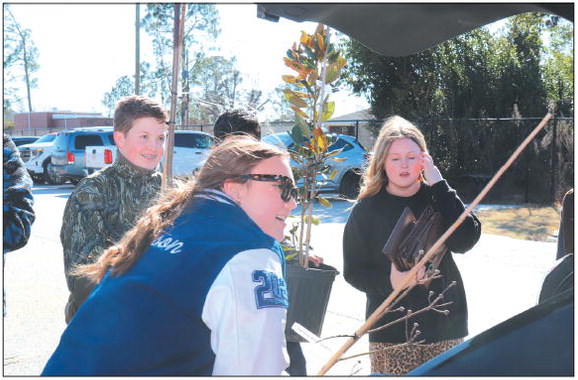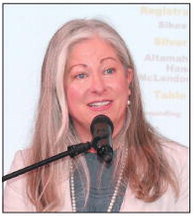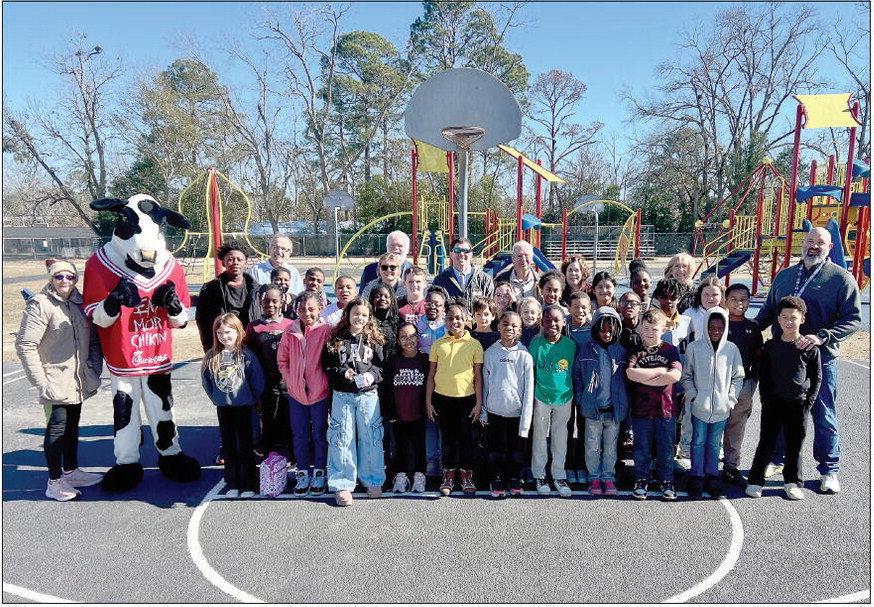continued from page ty, which ….
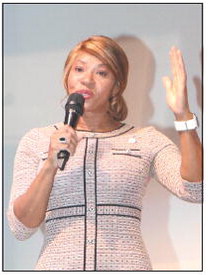

continued from page
ty, which collaborated with other surrounding counties’ republican parties to coordinate the forum. Four candidates – former State Representative Mesha Mainor, Dr. Randell Trammell, Candler County Schools Superintendent Fred “Bubba” Longgrear, and Dr. Nelva Lee – took to the stage to share information about themselves and answer questions from the public. Incumbent State School Superintendent Richard Woods had planned on being at the event, but was absent due to working in Dublin to help solve the issue of an outstanding financial deficit in the Dublin City Schools district.
Georgia Republican Party 12th District Vice Chair and Toombs County Republican Party Chairwoman Trish Poole kicked off the night with a memorial honoring political activist Charlie Kirk on what would have been his 32nd birthday. While welcoming attendees to the event, State Representative Leesa Hagan also memorialized a political figure and friend, State Representative Mandi Ballinger.
Hagan then turned to address the 2026 elections. “Next year is an important year in the future of our state. All statewide offices, all state house seats, all state senate seats, all U.S. Congress seats, and 1 U.S. senate seat are on the ballot in 2026, and understanding your options is incredibly important,” she stressed as she encouraged voters to listen intently to candidates and participate in the upcoming elections. “These people on the stage here are committed to public service and to the future of Georgia. Campaigns are not easy – they are very difficult. They take a lot of hard work, time, money, and sacrifice – not just from these individuals here, but also from their families and friends who are also invested in their campaigns. So, I just want to thank each one of you for being willing to run for public office,” she told the candidates.
Mesha Mainor
Former State Representative Mesha Mainor was the first candidate to address the audience, as she began by telling the audience about her time working with State Representative Hagan. “If you do not know that Representative Hagan loves you, she absolutely loves you because I have helped her with much legislation in the state house and the capitol,” she began.
Mainor informed the audience that she was a product of the public school system, and that both of her children attended public school – one graduated from a school in Atlanta and is now in college in Boston, and the other is currently in 8th grade.
She addressed her decision to change political parties in recent years, as she stated that often, this was a concern for voters. “I want to just tell you a little bit about myself because a lot of people know me because I switched [political] parties. A lot of people have said, ‘Well, you’re not a republican because you just switched parties.’ What I would like to tell you is as a democrat, when you’re growing up, a lot of times, you do not know what your political ideology is. It really was not until I became elected as a state representative that I realized the ideology of the democratic party was just not for me – mainly, it was education. I would butt heads with the democratic party quite often,” she
recalled. Mainor continued, “But as a democrat, I worked very well with my republican colleagues. The very first bill [I voted on] was the defunding the police bill. I voted against defunding the police as a democrat – I got a lot of [flack] for that. Then, it was the election bill. I was on the governmental affairs committee, and I just did not understand why people were not supporting the bill. So, on that committee, I was constantly for ensuring that our elections were transparent and people could be held accountable. After that, I also created something called the Unified Campus Police Act, which is basically making sure that colleges across the state of Georgia can work together with their police enforcement. In addition to that, I was elected vice chair of local redistricting as a democrat because the Speaker of the House at that time believed in my leadership on the education committee, which was actually one of my favorite committees.”
She spoke about her time on the education committee, saying, “On the education committee, we would have education advocates come, we would have parents come, and often times, when people would come down to the Capitol, some of our colleagues would silence them. It is very critical to me that parents have a voice. So, under my leadership as your next state school superintendent, I plan on implementing a program that I am going to call PASS. If students must pass their grade and we give them a report card, the state school superintendent and department of education should have a report card, too. You should know what is happening. If you don’t have a child in public school, it’s your tax dollars. [The education budget] is around 53% of the state’s budget – that’s around $34 billion. That needs to be accounted for.” Mainor also discussed the situation in Dublin City Schools, where the district is currently facing a $13 million deficit by 2026. “I do not blame the Dublin City Schools superintendent for that or the local school board for that because at the end of the day, the buck stops with who is in charge. And who is in charge right now is a candidate who decided not to show up today,” she commented. “There were audits that were not completed in about three years. Under my leadership, I will make sure that we are constantly auditing.“ She told the audience of other plans she had for the state public education system if elected to office. “When I initially come into office, one of the things that continued from page
I would like to do is to meet with every single school superintendent [in the state] and also every single school board member. On the education committee as a state representative, that was part of my job – working with local school board members to discuss curriculum policy with them,” she explained.
Mainor said that she believes that her background in policymaking sets her apart from other candidates, as she truly understands and has experience with the lawmaking process. “One thing that sets me apart from a lot of the other people up here is I do have a policy background. The laws that superintendents implement [are created by the state representatives.] So, it’s very vital for your next state school superintendent to have a really good relationship with these state legislators because once the law is created, the state school superintendent needs to be able to talk to their colleagues on the legislative branch and say, ‘Hey, what exactly did you mean by this?’ The state school superintendent’s job is then to go to the local community and explain what the new resource is, explain what the new policy is, and [explain] how it will be implemented,” she remarked.
She told the audience that according to the nation’s report card – an online resource that shares each state’s ranking in education compared to other states. “Right now, Georgia is down ten points over the past eleven years in math literacy and six points in reading literacy. There are some schools in the state of Georgia that have a 0% reading proficiency – that means you can walk into a school and 0% of the kids are able to read. That is unacceptable to me,” Mainor emphasized. “As state school superintendent, what I will do is ensure that every child has a chance, every parent or guardian has a voice, and every student succeeds. Succeeding is more than just getting an “A” or a “B.” Succeeding is what you are doing after school.”
Mainor explained that if elected, she planned on integrating the business community with the Department of Education, so students may have the opportunity to work with businesses and help prepare themselves for the workforce. She remarked that being a former state representative would help with this because she has contacts in several industries, and that being from Atlanta would also be an asset for this, because it has allowed her to have contact with several major corporations within the state. Mainor said that discussions have already begun about these industries collaborating, and even suggested that schools expand their agricultural trade education to include agribusiness. “So, when [students] graduate, we need our kids to already be on a path to success. Every child is not going to go to college – we understand that. But let’s increase our workforce development, [and] we need to increase our apprenticeships,” she shared.
She continued, “It is imperative that the state school superintendent understands everything – understands what is going on at the federal level. Yes, at the federal level, President [Donald J.] Trump is changing the U.S. Department of Education. A lot of those requirements that are happening at the federal level are now dropping down to the state level. There is going to be a need for communication between the federal government and the state level. I have that experience – I used to work at the Center for Disease Control, so it’s all about prevention there; I used to work at the U.S. Agency for International Development, which is also about prevention. More than that, I have spoken to President Trump on the phone – I may be the only candidate up here that has, I’m not sure. But there is already a line of communication between the White House and the state of Georgia through me.”
Mainor used her last moments of her address to give an example of workforce development that comes as a result of federal policy, as she stated that President Trump is currently overhauling the air traffic control system, causing a need for more workers in the field. “That means in Toombs County, your school can have an air traffic control curriculum. That is possible. We need to think beyond traditional education and we need to be thinking about what is in our future. We are no longer in a place where kids are going to learn sitting at a table for six hours. We really need to look at practical-based learning,” she concluded.
Dr. Nelva Lee
Dr. Nelva Lee was the next candidate to address the audience, as she began by sharing her experience with education, which she notes to be the “great equalizer.”
“Education has been my maker, my pathway, and my calling. Did you know that 70% of those who are incarcerated have the equivalent of a fourth grade education? That is what happens when we as a community fail our children,” she explained. ‘I believe that with every fiber of my being. I have lived that. As a freshman in high school, I decided I was going to be one of the first people in my family to graduate from college, and I decided to put my nose to the [grindstone] and work really hard, and I was inducted into the National Honor Society. The summer between my junior and senior year, I obtained a trade certification that allowed me to pay for college. I wasn’t really sure how I was going to pay for college and decided that I would work through college to do that. Since then, I have obtained my Bachelor’s, Master’s, and Doctorate degrees in healthcare administration. So, education has opened many doors for me that I never would have though were imaginable.”
Lee stated that one door that education had opened for her was through healthcare management positions, ranging from inpatient to outpatient, and nursing homes to hospitals. Governor [Brian] Kemp appointed her to the Department of Community Health Board in recent years, and she also served on various other boards and with several organizations. “I have been able to see firsthand effects of education,” she stressed.
Personally, Lee has been married for 25 years and has 3 kids, all of which took different education paths.
“If you’re a mother, you know that every single one of your children has a very unique [personality] and every single one of them is different, and that is one of the reasons that I am a strong supporter of school choice. So, I homeschooled my eldest child because he was autistic and needed a little bit of extra support; my second child ended up at a Christian school and I was a substitute teacher at this school, and my youngest child, who we adopted from Puerto Rico at the age of 8, came to the U.S. without knowing any English or having any background in reading or math, and I was able to really navigate the different options that we had for her. We put her in a Montessori school. So, I was able to see firsthand the benefits of school choice from my own children, and I believe that every child in Georgia deserves that. I believe that every parent in Georgia deserves that – deserves the opportunity to match the education with the child,” she remarked.
Lee is a supporter of the Georgia Promise Scholarship, which provides $6,000 for school tuition for students in schools in the bottom 25% academically in the state. “I don’t believe it went far enough. According to that Act, only the bottom 25% of schools are eligible for that scholarship; so, only families with students in the bottom 25% of schools can request that $6,000 scholarship. I believe that we should increase that. With your tax dollars, I believe that we should increase that to $8,000 for every child regardless of what school district they are in, [and] regardless of their region, race, or how much money [their family] makes,” she said.
She emphasized the need for school choice through different types of schools, such as charter schools, as she informed the audience that Florida has 726 charter schools while Georgia only has 97 charter schools. “One of the main reasons why charter schools in Georgia don’t succeed is because of funding. If every family member that wanted a different school environment for their children was able to bring those dollars with them, then we would have better options and better competition for our school systems,” Lee commented. “School choice does not mean that we have to get rid of public schools – it does not. A lot of school systems in the nation have a lot of different options. We should have those different options here – different magnet schools for example. We have a very low ratio of magnet schools here in Georgia. So, as [state] superintendent of schools, I would change that and improve the school choice options for our parents so that our children have the education that best fits them.”
Lee also explained that she wishes to see trade schools be used more in the state, as they were her path to success. “I believe that every child should have trade school certification upon graduating high school, and this is why: it allows those who have never have any intention of attending college to have a ready, available, career path right out of high school. And it allows those who want to go to college to have the option or opportunity to get real-world experience while they are going to college so that when they graduate, they have experience and a degree, which opens up doors. Trade schools don’t always have to be blue collar – yes, we need electricians, we need plumbers, we need welders, but in healthcare for example –I’m in the healthcare field – we need lots of different certifications that they can obtain right while they’re there in high school,” she told the audience, as she stated that these certifications would not come at extra costs because of the dual enrollment program.
She added, “All these are pipe dreams if we don’t first face the problems that we have. So, as Representative Mesha mentioned, a lot of these issues have only gotten worse in the last 8-10 years that Richard Woods has been at the helm. For instance, 50% of 3-4 yearolds haven’t had any enrollment in a school, which means by the time they get to preschool or kindergarten, they’re already behind. They don’t know their numbers, letters, none of that. 70% of our fourth graders are below reading levels. 76% of our eighth graders are below [their grade level] in math. That means that this whole time that Woods was in place, things have gotten worse. Yes, we had a pandemic, but the entire nation had a pandemic, so that’s really not an excuse.”
Lee said that she felt she would do better than the current state school superintendent, and even suggested that she would have town hall meetings to allow groups to share their concerns about education. She encouraged the public to not just vote in the election but communicate with candidates and officials to work to help improve the education system.
“I have leadership in the healthcare field, I’ve been a supervisor, I’ve been an adjunct professor at a trade school, where I taught individuals how to be medical interpreters. I have expertise in the healthcare field, I have expertise in the education field, and I believe that we can do better for our students here in Georgia,” she concluded. Dr. Randell Trammell
Dr. Randell Trammell began his address by sharing that his wife had been a teacher for 17 years, and his children are currently in elementary school at the school that his wife teaches.
“I’ve spent the last 23 years running an education nonprofit [organization] called the Center for Civic Engagement,” he informed the audience. “Over the last 23 years, I’ve served about 1.7 million students across the state of Georgia, including some of your children and some of the students in your school systems. The thing that we do is we teach students that they must become informed and active students. We want them to know not only what ‘We the People’ is but how to be the people, and what the Constitution means and all of that.”
Trammell explained that the organization had received several federal grants, allowing them to work with school systems across the state. In addition to this, they recently received a new federal grant to offer a graduate program for social studies teachers.
“I am committed to public education. We do have some challenges in public education, and I am one of those [people that say] if the baby’s ugly, let’s put a bow on it and make it as pretty as we can, but the baby is still ugly. The sooner that we talk about it, then we can address it,” he said.
He overviewed several of the issues with Georgia’s education system, as he argued that the state was falling behind on educating the next generation. “So, first off, Georgia is the number one state [in the nation] to do business with – we have been for 12 years. That’s great, that takes work, that brings revenue into our state, which helps fund everything else – our legislature [and our governors] have made it a priority and we have done a great job at it. But, educationally, where do you think we stand? The truth is we land number 38 in the nation [for education]. Are you okay with that? I’m not okay with that,” he remarked.
Trammell continued, “Right now in Georgia, 70% of our third and fourth graders cannot read on grade level. That is a tragedy, and do you know why it is a tragedy? Because we take that third grade reading level and that’s how we determine the number of prison beds that we are going to need in the future. So, that tells me one thing: we better get serious about teaching our kids reading, writing, and all the basics, or we better get to building some prisons. I don’t know about you, but the Georgia that I want for our kids – the Georgia that I want for my family – is the Georgia where our kids are educated, where they are growing up and our communities are full of options.”
Yet, he stated that literacy was not the only issue within the state, as behavioral issues were plaguing the classroom. “We have a literacy crisis, [but] we have a discipline crisis in our state, too, in our classrooms. Just a few weeks before school got out in Dekalb County, two students beat the tar our of one of their teachers. Their superintendent got on the radio and said, ‘You know, those kids are misunderstood.’ Let me tell you: those kids need to be held accountable for their actions. Teachers are there to teach. Students are there to learn, and anything that disrupts that is wrong and will not be tolerated on my watch,” he emphasized.
Trammell shared that another aspect of education that is hindering success is the CCRPI system, which tracks attendance, discipline referrals, and more in the classroom. “It absolutely is crippling our schools with all these different things that judge what we are – you’ve got attendance, you’ve got academics, you’ve got school climate – all of this. And if you have too many discipline referrals, it counts against you. Listen, we have to scrap that mess and we have to come up with something that makes sense to tell us how we are really doing, and if we’re not doing great, that’s fine – let’s have a talk about it,” he told the audience.
He referenced the health grade at the Waffle House as an inspiration for how simply schools should be graded on their success. “I want our grading system for our schools to be that simple, and I want us to be able to know that we are failing in this area or we are successful in this area. It’s not so we can get you, it’s so we can come around and support you with resources and best practices and see what it is that you need. Do you need additional resources? Do you need additional teachers? Sometimes, what you need is for the state department of education to get out of your way, and I know that,” Trammell shared. “So, I want to make sure that we’re transparent about how we’re actually doing, and if we’re not doing grand, then we fix it.”
Like the previous candidates, Trammell addressed the situation at Dublin City Schools, as he explained that this deficit exemplifies the need for school systems and the Department of Education to be accountable and transparent. “[Former Dublin City Schools Superintendent] Fred [Williams] is a wonderful man, [and was] the Superintendent of the Year last year for the state of Georgia. The audits hadn’t been turned in since 2021 – the problem with that is at the top. Why wasn’t there a phone call that said, ‘Hey, what’s going on?’” he said. “There has got to be some accountability. Not only is the [state school] superintendent missing in action tonight, he’s missing in action when it really counts. This last year, in the state legislature, at the end of the session, we had bill signing day. All of the constitutional officers were there, the secretary of state, Chris Carr – all of them on education day [with] 8 bills. We are not talking about inconsequential bills, we are talking about the literacy bill; we are talking about the school safety bill. And not a single soul from the department of education was there – that’s a shame. Not only does he not show up there, he doesn’t show up in the community, he doesn’t show up in the legislature, [and] he doesn’t return phone calls. You have to have an advocate in that cabinet. You have to have someone there who is tough about the schools and standing up for the schools, standing up for the teachers, and standing up for the students. If it’s not him – which it is his job – then who is it?”
“I’m not happy with where our schools are, and I am not happy with the way he is representing us in this state. The status quo has got to go, folks. Twelve years is enough – that is a kid’s entire K-12 education, and you don’t get a second chance at it,” he added.
Trammell shared that he also wishes to improve the teacher recruitment process if elected. “Teaching Retirement System of Georgia tells us that within the first three years of a brand new teacher’s career, 53% [of new educators] are leaving the profession. We’ve got to keep these continued from page
teachers. We’ve got to figure out how to keep them past 20 years,” he remarked. “Teaching should be a joy. It should be the most magical thing. We have done a good job at raising salaries; we’ve done a good job at helping with those things, but we can do more. But most of these teachers didn’t take [the job] for the salary – they took it because they were called. Many of you educators here are called to do that. We need to support them and get out of the way.”
He also spoke on his stance regarding school choice, which allows students to attend any school they desire if accepted. “I am a parent choice candidate. Now, my wife is a public school teacher, and a lot of my friends are; people get nervous when I start talking about that. This is what I mean – and there’s already a lot of choice in Georgia – you’ve got the college and career academy, you’ve got stem schools, you’ve got magnet schools, you’ve got charter schools, you’ve got open districts with multiple schools where you can go to any school in the county – so many of the schools across our state are failing. If you remember, with the Georgia Promise Scholarship, they had to redo the list because there were too many schools on there. I want to make sure that parents have a choice when it comes time for them to do what’s best for their child,” Trammell told the audience.
“Hear me clearly: I am 100% in on public education, but until I can shake your hand as a voter, taxpayer, parent, and grandma, and tell you that you have the best, we are required by Georgia’s Constitution to provide options – that free, appropriate education,” he concluded.
Dr. Fred “Bubba” Longgrear Candler County Schools Superintendent Fred “Bubba” Longgrear was the last to introduce himself to the audience, and began by sharing information about his family. Longgrear is married to a teacher and cheerleading coach, and the couple has three children – two of which have graduated from Metter High School and currently attend the University of Georgia, and one of which is currently a Metter High School senior.
“I am in my 11th year as a school superintendent at a small rural district over in Metter. I have spent 30 years in public education,” Longgrear explained, as he stated that teaching had been a dream of his throughout his life. “My goal and my dream was to be an educator – to be a teacher, and to specifically, be a coach. That’s what I wanted to do – be like the people who poured so much into my life. That was the plan, but God’s are often better than ours. I had the opportunity to get into administration at an early age. I became a high school principal at 28 years old, did that for 7 years, and then was called on by another district to be an assistant superintendent for 7 more years, and then have been a superintendent for 11 years.”
Longgrear currently serves as the Georgia School Superintendent Association President – a position which he states has given him the opportunity to work with several leaders and build close relationships with school superintendents across the state, and even led to his pursuit of office.
“Last year, during the last legislative session, I spent around 25 days at the Capitol serving in the role as the president of the Georgia School Superintendent Association, and I was there helping to work on some legislation. During that time period, I developed some wonderful relationships with a lot of legislators around Georgia, but what I realized was there is a major absence there from our current superintendent of the state. An epiphany hit me: we are struggling at the local district because of the lack of someone willing to sit around the table, listen, communicate, and share their perspectives of the local district with those who are there to make policies. At that point, it really burdened me, and I thought, ‘This is something that someone needs to step up and do,’” he explained.
Longgrear continued, “Well, a little bit later, I had people start coming to me and saying, ‘Bubba, you need to run for state superintendent.’ The first two or three [times people said it], I thought that was a pretty good compliment. Then, after ten or twelve times, I started praying and asking the Lord if that was something He was trying to tell me to do.”
He spoke on his leadership skills, saying, “I can promise you my leadership history have been built on collaboration, accessibility, willingness to listen, and educating children and being innovative in the offerings and opportunities that we provided to them when I was superintendent. I promise you I will do the same thing [at the state level].”
He explained that he had three core focuses throughout his campaign: safety, literacy, and career development. Longgrear took the remainder of his time to address his stance on each of these issues.
“When it comes to safety, our legislators and our governor have done a wonderful job of equipping local school districts with the ability to protect their schools from external threats, and I am so grateful for that. I think we are very safe right now in our schools. The [school shooting] tragedy at Apalachee [High School last year] was terrible, but the response was amazing. The loss was tragic but the way they responded to that was amazing and it was due in part to the resources that our legislature and government put forth and [the school was] able to have,” he commented.
“The behavior expectations that we have for students has been compromised in a lot of school systems in Georgia. We need to be very clear of what is tolerated [and] what is allowed; we need to get bold and courageous. You know, you watch those Charlie Kirk videos and he is so motivating and inspiring from the standpoint of standing up for what is right,” Longgrear added. “If you were behaving in a way in school that would impede you from being successful afterwards and we are tolerating it, it’s our fault. We need to address behavior issues. If you are disrupting the learning of others to a significant manner, we need to find another option for you to be educated because we are not going to sacrifice the students in those classrooms.”
He continued, “I think one of the greatest barriers between teachers enjoying their work instead of just trying to make it to 30 [years] is because of the handful of discipline issues that we are too fearful to address – that we are fearful to confront because of retaliation or retribution. In our local district, we have been able to take a firm stand on that and I think our culture reflects that. And I will do everything I can to make sure that’s the case across the state of Georgia. We need to be more bold in dealing with that.”
Longgrear then discussed literacy, as he stated that the issue was improving within the state but needed to continue moving forward. “From a literacy standpoint, we’ve made some good strides in Georgia. I am one of the three superintendents on the literacy council for Georgia; we were appointed by Lieutenant Governor Burt Jones. We actively meet, and there’s been a lot of progress – there’s a lot of specific results that have come out of it and a lot of organic conversations that have come out of the literacy council. Historically, literacy has been the core focus of what we do, but I think it has become – without a doubt – the most important work in public education. Georgia is starting to see some benefits from that even though we have a long way to go, as some of the candidates have pointed out here,” he remarked. “Part of that goes back to Birth to 5 [year-old children] and how local school systems are partnering with our Birth to 5 community and parents to make sure that collectively, everyone is pulling in the same direction.”
He emphasized his belief that career readiness and development was crucial to helping students prepare for life after high school. “I believe that a career is a God-given blessing and public education needs to make sure that we are preparing our students for beyond graduation – be that go to Ivy League, be that go to technical college, be that go directly into the military, be that go directly into the workforce,” he stated. “I’ve had a lot of people ask me why don’t we go back to a college prep track and a technical track. My answer is this: I think we need to individualize the education opportunities for each student to make sure that when they graduate, just as we do for our own kids, they are provided with the best opportunity for them to be successful in what the family chooses for them to do and not try to meet some criteria or something that doesn’t take into account their individual needs. I feel strongly about that.”
Longgrear explained that in Candler County Schools, the district had created a soft skills curriculum that was included in the classroom from Kindergarten through 12th grade. “We are teaching soft skills early in kindergarten all the way through school, and that culminates in apprenticeships and internships in places like Daniel Defense, Hyundai Motor Group, and Georgia Ports Authority,” he said.
He stated that many students don’t have a career plan or path because they don’t have the hope or belief that they could attain those things, but by working one-on-one with students through individual graduation plans, this hope could be restored.
“I commit and promise to do everything I can. I’ve built some good relationships with legislators, the governor, speaker, and a lot of house and senate members, but I promise also to work with our local superintendents, principals, and teachers to find out where we can improve in [each] particular district,” he concluded.
Questions
After introducing themselves, the candidates answered several questions from the audience regarding their position on various situations and issues within the education system.
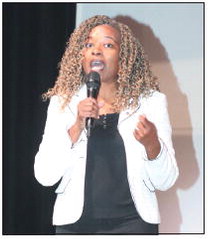
Dr. Nelva Lee.
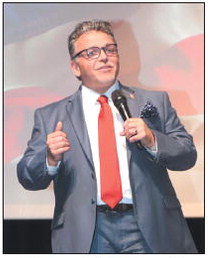
Dr. Randell Trammell.




